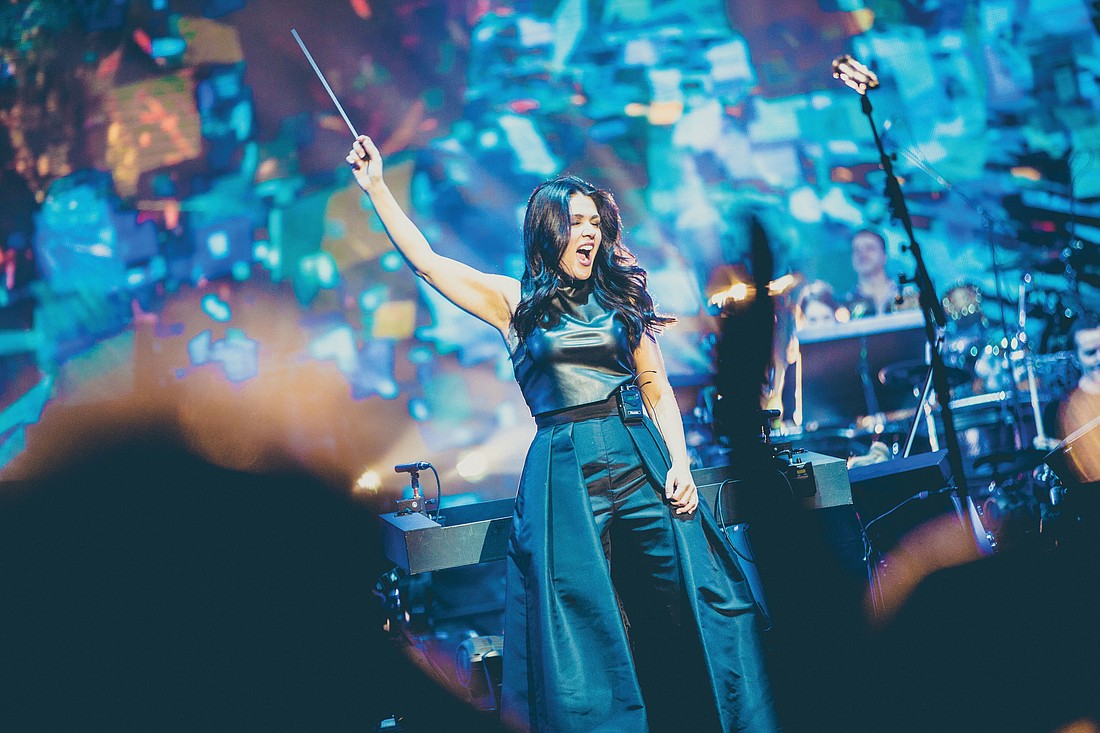- April 25, 2024
-
-
Loading

Loading

The Sarasota Orchestra wrapped up its “Great Escapes” concerts last week with “Dance! Dance! Dance!,” a concert devoted to works in dance rhythms, conducted by Alexandra Arrieche.
Leading this parade of dance was Hardiman’s “Lord of the Dance,” a potpourri of music he wrote for Michael Flatley’s tour of the same name. As in much of Irish step dance music, the emphasis is on double and triple rhythms, with the melodies being a bit secondary. It gave a good workout to the violins, but much of the detail was lost, given the negative acoustics of Holley Hall.
Principal pianist Jonathan Spivey was featured soloist in “Candelabra Rhumba,” a movement from Daugherty’s “Le Tombeau de Liberace,” a tribute to that flashy showman and pianist. It is replete with a great deal of piano pyrotechnics and rhythms, Grieg and Liszt-like cadenzas and percussion. Yes, the piece is pretty much tongue-in-cheek, but that doesn’t keep it from being a difficult piece to perform. Stage logistics kept the piano at the rear, but closed circuit TV gave the audience a good view of Spivey’s expert playing.
Some pieces are best left untampered with, and that was my feeling with the Brahms Hungarian Dance No. 5, “Redux” by Hyken. The simplicity of the original was augmented by adding new harmonies, percussion, brass and episodic changes in the original form. Best addition was the well-played cadenza passage by Associate Concertmaster Chris Takeda, since to me the balance of the piece was interesting but unimpressive.
What’s not to like in Offenbach’s overture to “Orpheus in the Underword”? It has lovely cadenzas, beautifully played by clarinetist Bharat Chandra, oboist Nicholas Arbolino and violinist Takeda. It has a lovely waltz section, and of course, it ends with the rousing cancan, which is probably known to almost every living creature. I must admit that when the cancan arrived, there was no difficulty in remembering how small Holley Hall can be with a full orchestra pulling out all the stops. Loud, but good.
Two numbers from Bizet’s Carmen Suite No. 1, the “Habanera” and “Dance Bohéme”were well performed, though I do miss the voices. Arrieche started the dance much slower than I’ve ever heard, but did speed and spice it up for the finale.
Transcribing pieces from the big-band era for symphony orchestra can present a real problem, both in arranging and performance, because the big bands seldom used strings, except for the bass. Frankly, it’s just easier to make the music “swing” with 18 players than 48 or more. “April in Paris,” which opened Custer’s “A Salute to the Big Bands,” is a case in point. In that piece the Count Basie riffs work with a dance band, but sometimes sound pretty “square” with a big group. Still, audience members loved recognizing the parade of their favorite songs.
Probably the least effective piece of the evening was Tyzik’s “Hot Soul Medley,” in which the confined sound of Holley Hall worked against both clarity and intent.
The most interesting work of the evening was Danzón No. 2 by Márquez. This Cuba-based dance transferred to Mexico and Brazil has all the seductive rhythms, subtleties and fire of its Latin origins. Arrieche obviously felt completely at home with these rhythms and melodies, and this performance was the most exciting of the evening. Again Chandra, Arbolino and Takeda were featured, followed by many of the winds and brass, with everyone getting in the mood for this rousing concert closer.
Of course, there had to be an encore, and what more fitting than a tribute to the home country of conductor Alexandra Arrieche, than Ary Barroso’s “Brazil.”
To be sure, there were peaks and valleys, but it did turn out to be a wonderful evening — a fitting finale to “Great Escapes” for this season.